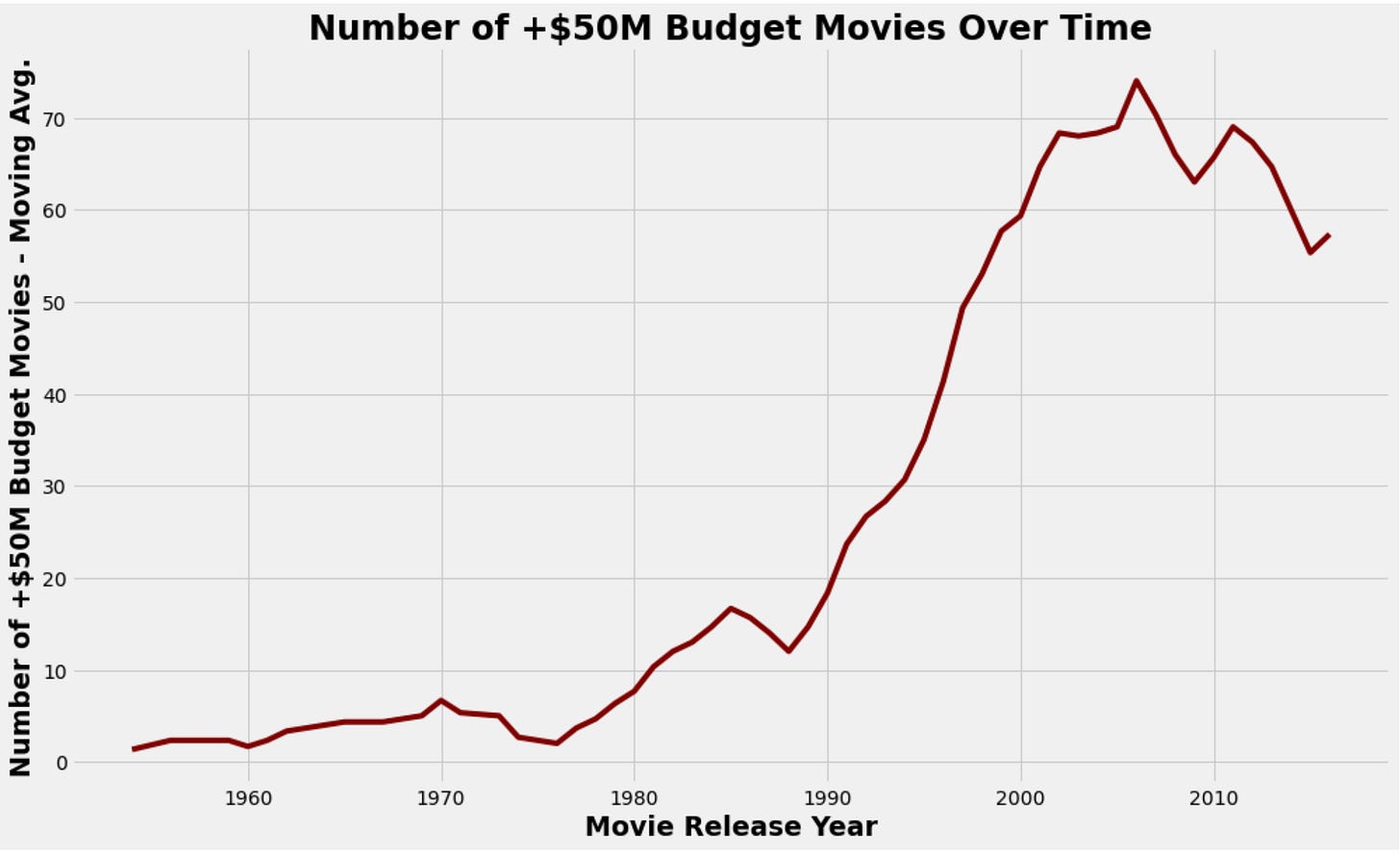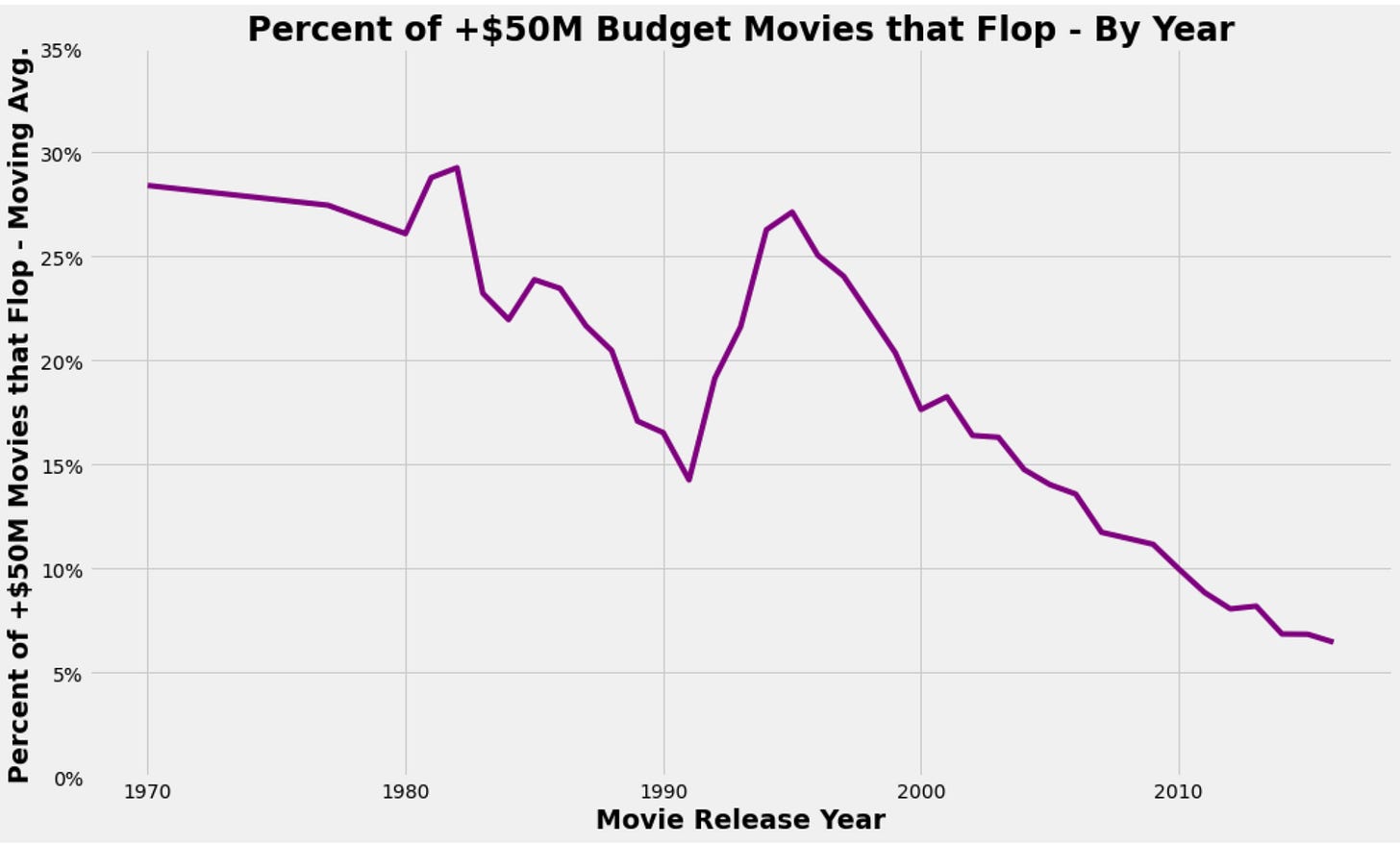Do Hollywood Flops Kill Movie Careers? A Statistical Analysis.
Do box office bombs derail acting and directing careers?
Intro: The Calamity of Heaven's Gate.
Heaven's Gate (1980) may be the most consequential box office flop in film history. Director Michael Cimino, fresh off a Best Picture win for "The Deer Hunter" (1978), was given free rein by United Artists to realize his vision for a sprawling Western set in the American frontier circa 1870. Such immense creative freedom would ultimately prove an ill-fated decision.
The making of Heaven's Gate is the stuff of Hollywood legend, with its extensive delays, ballooning budget, and Michael Cimino's dictatorial directing style. Cimino, a stubborn perfectionist, demanded extreme historical accuracy, featuring props, costumes, and sets authentic to the film's 19th-century setting. Furthermore, Cimino's shoot days ran up to 20 hours as he had people do countless takes for a single shot (sometimes as many as 100).
Initially set at $11.6 million, the film's budget soared to $44 million (the equivalent of $160M today), making it one of the most expensive films ever made at the time. But it gets worse. Cimino insisted on complete control over the film's final cut and then produced an initial version that ran five hours long, which the studio deemed commercially unviable (unsurprisingly).
And if you're hoping for this story to get better, I have bad news for you. Following its premiere in November 1980, the film received significant critical backlash, prompting United Artists to pull it from theaters and re-cut a shorter version released months later. The film's poor reception was marked by disastrous box office performance, earning a mere $3.5 million in the United States. The financial fallout from the movie was so significant that it heavily contributed to United Artists' bankruptcy later that year.
Meanwhile, Cimino's career never fully recovered from the Heaven's Gate debacle. His complete filmography is remarkably short, considering his second Hollywood production won five Oscars (including Best Picture) and earned a profit of $35M ($145M today):
Cimino's foible enjoys near-mythical status within Hollywood lore, a cautionary tale of a high-flying auteur undone by extreme hubris. And while the details of Heaven's Gate's production and aftermath are dazzlingly scandalous, the film is simply one entry in cinema's long-running history of poor financial investments.
So, is Cimino's post-Gate fate the norm in Hollywood — can a flop truly damage a career? How does the fallout from a box office bomb impact the future prospects of actors, directors, and producers? And how has the landscape of Hollywood flops changed over time?
Methodology: Tracking Flops and their Aftereffects.
Our goal is to determine whether box office bombs derail Hollywood careers.
Analysis Questions:
How do career prospects change for actors, directors, and producers following a flop movie?
Which actors and directors saw their careers derailed following a film with poor financial performance? Which actors have survived numerous flops?
Has the frequency of Hollywood flops changed over time? And how have studios responded to these trends?
Defining a Flop:
Typically a film is considered commercially unsuccessful if it fails to turn a profit. "Flops," as they exist within the popular imagination, perform significantly worse than a slight profitability miss. Instead, box office flops are the worst of the worse, the type of film that substantially impacts a studio's bottom line and can derail movie careers.
Our analysis deems a movie a "flop" if its inflation-adjusted budget exceeds $50M and the project fails to recoup over 50% of its initial funding in US ticket sales. Conversely, if a film within this same budget category earns more than 50% of its initial funding, it's not considered a flop.
We can then compare the difference in career trajectory between filmmakers (actors, directors, producers) involved in flop movies vs. those who avoided flops.
Dataset:
A dataset of over 5.5k movies with inflation-adjusted box office and budget.
How Do Hollywood Careers Change Post-Flop?
Disney's John Carter (2012) ended in disaster for all parties involved in its making. The movie was supposed to be the inaugural installment in a series of sci-fi movies inspired by Edgar Rice Burroughs' "Barsoom" books. But Disney’s John Carter franchise was not meant to be (though it’s not like Disney is starved for franchise properties).
John Carter was a box office bomb, with Disney reporting a loss of around $200 million on the film, an inglorious failure that contributed to the immediate departure of Rich Ross, then-chairman of Walt Disney Studios. Andrew Stanton, the film's director, known for successful Pixar productions like Finding Nemo (2003), was essentially placed in movie jail (for live-action cinema, at least), eventually returning to direct animated projects like Finding Dory (2016).
And if the fallout weren't already enough, the box office bust severely hampered the leading-man prospects of star actor Taylor Kitsch. A breakout talent from TV's Friday Night Lights, John Carter's failure hindered Kitsch's transition to the big screen. Kitsch continues to work in high-quality productions (Lone Survivor, True Detective) but mainly functions as a supporting actor.
Public flops like John Cater can destroy the careers of artists and capitalists alike, disincentivizing future investment in their work. We see meaningful decreases for producers, directors, and actors when analyzing the relative difference in post-flop production budgets (compared to that of non-flops):
Directors incur the most significant reputational hit for a flop, as they bear supreme ownership over the film's creative vision while simultaneously utilizing someone else's money to craft that vision. Producers see the second largest drop-off in future funding post-flop, as they are responsible for deploying capital (using personal funds or the studio's money) and thus will likely see diminished capital investment for future works.
And then we have actors who are seemingly found guilty by association. Lead actors associated with flops see a significant dip in future project budgets, with second leads experiencing a nominal drop in project funding. But it's not just budget. Actors can lose their leading-role status following a noteworthy bomb.
When we look at average credit orderings (1 representing the lead actor/actress and 4 representing the 4th leading actor/actress), we see a marked increase in credit order post-flop (compared to those who do not experience a flop):
Punishing actors for involvement in a poorly received film feels like a karmic injustice. Sure, actors may bear some responsibility for a failed work by delivering a poor performance, but directors and producers have much more say in how a movie comes together. Furthermore, many performers have limited career options (they must wait for film offers) and take jobs because they need the work (a novel concept).
So imagine you're Taylor Kitsch, and you got your first leading role in a Disney-produced blockbuster from the creator of Finding Nemo. And then imagine you, Taylor Kitsch, are relegated to leading-man movie jail because you said yes to that promising project which is now a highly-public flop. Hollywood truly is a cruel business.
Which Actors and Actresses Saw Their Career Derailed by Flops?
Are all flops career killers? Hardly. Many actors and directors evade the prospect of movie jail by leveraging prior career capital or distancing themselves from unsavory work. Consider Cats (2019), a dumpster fire fever dream of a broadway musical adaptation featuring numerous Oscar winners and two actors that have been knighted.
While director Tom Hooper has seen his career options limited following Cats' failure, the distinguished cast largely escaped unscathed. Cats castmates Rebel Wilson and James Corden even mocked their participation in the CGI blockbuster nightmare by dressing in cat-face at the 2019 Oscars:
Cats is not alone in its uneven distribution of cosmic punishment. Sometimes flops permanently change the trajectory of a career, while other times, a box office bomb exists as a footnote on an otherwise distinguished resume.
When we examine the list of actors who have experienced the most significant decrease in budget and the largest increase in credit order post-flop, we find a group of once prominent performers who moved to a different type of film (from blockbusters to indies), transitioned to a new medium (movies to TV), or fell out of the zeitgeist completely:
Our list of fallen performers provides us with a few potentials interpretations for why flops can so significantly harm a career:
Aging Actors: Hollywood roles generally skew younger. Thus a bomb for a leading actor in the later stages of their career could further reduce an already limited set of options. Consider Dustin Hoffman, Danny Glover, Chevy Chase, and Sharon Stone. These actors were in highly public flops toward the end of middle age, after which their career trajectory changed. Producers may interpret a flop as proof of an actor's fading commercial appeal (which is harsh).
Actors Changing Project Preference: Sometimes, actors opt out of blockbuster movies following a largely forgettable experience on a high-budget film (or series of poor experiences). Nicole Kidman took on several high-quality television projects (Big Little Lies, The Undoing, etc.) following two prominent box office bombs. Similarly, Colin Farrell has found recent success in indie films and supporting roles.
Actors with Flops Early in Their Career: Hayden Christensen, Macaulay Culkin, and Matthew Modine were prominently featured in flops at the onset of their careers. These actors enjoyed notoriety from previous high-profile projects (Star Wars, Home Alone, and Full Metal Jacket, respectively) but lacked career capital to survive the stink of a box office bomb.
The story of cause and effect is decidedly less complex for directors who steward a flop:
I could dazzle you with highly complex yet thought-provoking analysis, weaving a compelling narrative from this assortment of data points, or I could provide you with the most straightforward interpretation of this list: these directors made bad films and lost studios a lot of money. You lose someone else's money; you lose the ability to get money in the future. That's capitalism.
And yet there are numerous examples of actors, and a small handful of directors, who survive multiple flops with no degradation in future funding:
Our list of flop-resistant performers is 100% male (which you can interpret however you want) and skews toward comedic actors.
Meanwhile, our group of directors surviving multiple flops is quite limited:
The lack of depth on this list further underscores the fragility of directing careers. So, if you're a director, you probably want to ensure your film is good and/or makes money — some novel data-driven advice.
The History of Flops:
When it comes to project financing, the entertainment industry has many parallels to the tech world. Venture capitalists and studios line up a series of bets: sometimes, these bets result in money loss, while other times, these bets produce asymmetrical, supranormal returns. Of course, project failure is baked into this funding model, a truth venture capitalists readily accept — yet studios have changed their risk appetite over the years.
Between the 1970s and early 2000s, the number of Hollywood flops slowly increased:
Sometime in the late 2000s, the annual frequency of Hollywood flops began to decrease. So what happened?
The number of $50M projects (flop and non-flop) increases up until the mid-2000s, at which time high-budget project output plateaus:
The reduction in high-budget film production can account for some of the observed slowdown in flop frequency, but other factors are likely at play. Looking at movie flop rate over time provides a compelling narrative on the fall of box office bombs:
Over the last two decades, studios have significantly decreased their rate of movie flops. Put differently, studios are more efficient with their spending, as each high-budget project enjoys a greater chance of success (or, rather, a higher likelihood of avoiding failure).
And how have Hollywood studios managed to increase the efficiency of their big-budget spending? By leveraging existing intellectual property — that is sequels, reboots, and adaptations of previously beloved stories — studios guarantee a built-in audience for their most capital-intensive projects.
For example, John Carter's failure prompted Disney to reevaluate its approach to producing and marketing big-budget films. The studio shifted its focus towards more established and bankable intellectual properties, like Marvel, Star Wars, and its own animated classics for live-action adaptations. Spend efficiency increased as originality fell.
Final Thoughts: Risk and Creativity.
Apocalypse Now (1979) is the poster child for a movie gone off the rails. A war film about the madness of Vietnam, Francis Ford Coppola's masterpiece is infamous for its tumultuous production process. By the time production had finished, the project's lead actor had suffered a heart attack, a typhoon had destroyed the film’s sets, Coppola had experienced an epileptic seizure, and the budget had ballooned from $12M to around $31M.
Meanwhile, mid-way through shooting, Coppola professed confusion around what he was even making. The director wanted to create a more profound, artistic, and symbolic work, meaning that many scenes were improvised and the script was constantly in flux.
Despite its flaws, Apocalypse Now was released to critical and commercial acclaim and has become a classic in the war film genre. In fact, the troubled production process only added to the film's mystique and status as a historical work.
Innovation typically stems from risk. Apocalypse Now posed a massive risk for Coppola and his backers. The result of such risk is a Hollywood classic that vividly captures the essence of madness — assembled by a cast and crew slowly going mad during a miserable movie shoot.
And yet Coppola's immense creative risk is a vestige from an age of director-friendly studio movies. Since the 1990s, movie studios have undergone considerable consolidation. Today, there exists a "Big Five" of major movie studios (Universal, Paramount Pictures, Warner Bros., Disney, and Columbia). These studios respond to incentives from public markets or their corporate owners, and these financiers do not like failure (especially highly visible failures).
Furthermore, movie studios face pressure to grow their bottom line indefinitely — because that's how capitalism works. As such, these studios simply cannot afford a box office bomb. So that leaves us in a world of largely risk-averse big-budget productions — films engineered to succeed and not push boundaries.
Big swings are essential to creative innovation. And sure, sometimes excessive risk leads to public failure and heavy financial losses, but sometimes it doesn't. For every Heaven's Gate there is an Apocalypse Now. Unfortunately, both films and the creative license their filmmakers enjoyed are a relic of Hollywood's past.
Want to chat about data and statistics? Have an interesting data project? Just want to say hi? Email daniel@statsignificant.com
















This raises some questions as to interpretation. I think it makes more sense to talk about this as regression to the mean and an 'audition' view of things. The flop doesn't 'destroy' their career, it merely means they failed the audition for a higher role.
You highlight as paradigmatic Cimino and Stanton as having 'fallen' after their flop, but if you remove your selective citation of _Deer Hunter_ and _Finding Nemo_, their careers don't look *that* different before/after. Cimino had made one low-budget film 4-5 years before _Deer Hunter_, and he... went on to make more low-budget films at a roughly 5-year cadence; he just didn't get to make another ultra-high budget AAA film like _Heaven's Gate_. Stanton was disgraced by _John Carter_ and didn't direct another huge live-action extravaganza... but looking at his filmography https://en.wikipedia.org/wiki/Andrew_Stanton#Feature_films _Finding Nemo_ had been his *only* director spot, and he continued working high-profile films (writing/producing), directing episodes, and a bunch of other stuff, he just didn't get to direct Pixar's main films _Coco_/_Soul_ etc. Interpreting the subsequent smaller projects as 'killing their career' seems a bit like asking why the lottery winner got so unlucky when he bought another ticket & it didn't win.
They hardly got turfed out of the industry; considering how many people are avid to, and never get to, do as much as Stanton or Cimino got to do after they supposedly were exiled to Siberia for their flop, it doesn't seem like there was much 'effect' on their baseline career. It looks more like they were given an opportunity to 'take it to the next level' and when it 'flopped', they were presumed to not have what it took for the next level & to be the next Steven Spielberg - but to remain highly competent & hireable at their prior level.
Similarly, the actors: it doesn't sound like they were penalized so much as remained on their original trajectory. If that trajectory was misleadingly high, because you've cherrypicked actors coming off huge one-off anomalous successes, well then, they are going to regress to their lower mean as they 'fail to show the right stuff' with a standout performance. And if they are a well-known quantity, then a flop offers little information on their talents, so no one cares or punishes them for it. (I mean, what, if Eddie Murphy is in a flop, are you really going to conclude, 'oh, I guess the man was never funny after all'?)